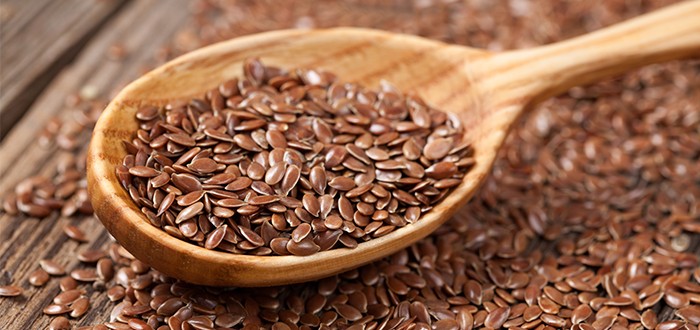Something that usually happens before peritoneal mesothelioma strikes is the peritoneum becomes acutely inflamed.
Researchers have discovered that flaxseed lignan component appears to significantly reduce such inflammation. At least that’s the case in lab mice fed a diet rich in flaxseed.
This is a potentially very significant finding because if there is no inflammation of the peritoneum then mesothelioma might never get started.
The researchers spelled it all out in an intriguing article published in the journal Carcinogenesis. The title of their work is “Flaxseed Lignans Enriched in Secoisolariciresinol Diglucoside Prevent Acute Asbestos-Induced Peritoneal Inflammation in Mice.”
It was co-authored by researchers from Fox Chase Cancer Center and the University of Pennsylvania Perelman School of Medicine, located in Philadelphia.
Flaxseed Anti-Inflammatory Properties Explored
As the name implies, flaxseed is the seed of the flax plant. Flax is edible, so it’s grown on farms both as a food crop and as a nutritional supplement.
Flaxseed turns out to be rich in dietary fiber and omega-3 fatty acids. When you consume flaxseed, your body breaks it down into chemicals known as lignans.
Researchers don’t fully understand how flaxseed lignans work. But they speculate that the lignans prevent blood cells from sticking to — and helping clog — anatomic structures such as artery walls.
And, as the Fox Chase and Perelman research team members observed, flaxseed has the ability to prevent inflammation. It was this characteristic of flaxseed upon which they focused.
They made flaxseed’s anti-inflammatory properties their focus in order to examine its potential for counteracting the damaging effects of asbestos fibers trapped in the abdomen.
“Flaxseed lignans, enriched in secoisolariciresinol diglucoside, have antioxidant, anti-inflammatory and cancer chemopreventive properties,” the researchers contended.
Tested on Mesothelioma-Prone Mice
The researchers built their study around mesothelioma-prone lab mice that they had exposed to asbestos. They accomplished this by injecting into the peritoneal cavity of each mouse a 400 µg bolus of crocidolite asbestos.
A week beforehand, about half the mice started receiving flaxseed lignans with their daily meals. The other half did not receive flaxseed lignans.
Ten days later — in other words, three days after asbestos exposure — the mice were checked for abdominal inflammation, pro-inflammatory and pro-fibrogenic cytokine release, WBC gene expression changes, and oxidative and nitrosative stress in peritoneal lavage fluid.
The mice that ate no flaxseed lignans were found to have developed acute inflammation. Their WBC gene expression counts were way up, too. So were pro-inflammatory and pro-fibrogenic cytokines in relation to baseline levels.
However it was a different story for the mice that received flaxseed lignans as part of their diet. Everything that was up for the flaxseed-deprived mice was down for those that ate it.
The researchers pointed out that flaxseed has for a while now been thought capable of preventing other types of cancer. It’s a short list, however. On it are breast, colon, prostate and lung cancers.
Mesothelioma isn’t on that list. But it might be now, if the Fox Chase Cancer Center and Perelman School of Medicine research holds up in human testing. That will, of course, be the next item of business. You can be sure of that.


